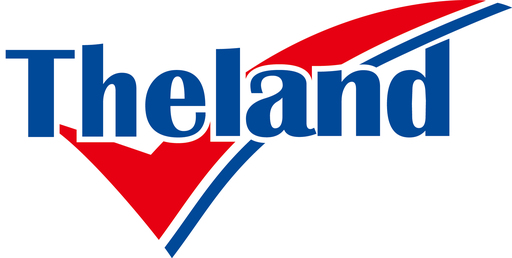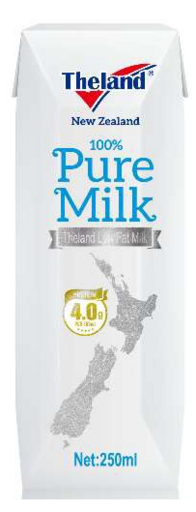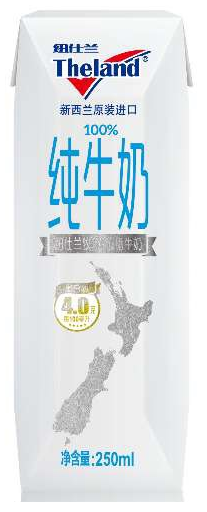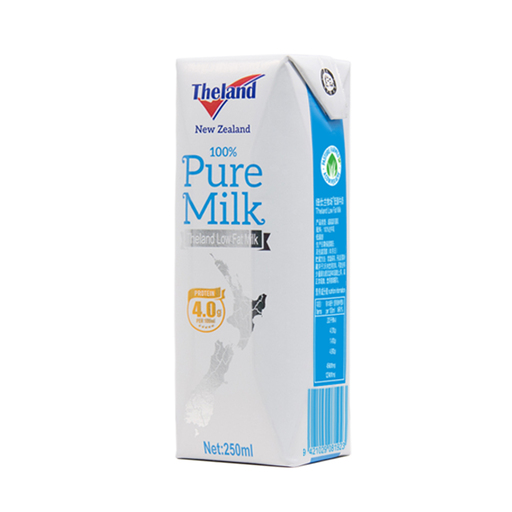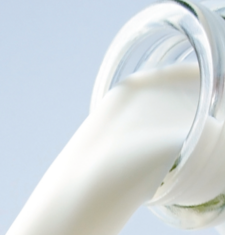
AQ Assured by AsureQuality, New Zealand's Government-owned food assurance company.
Theland UHT Low Fat Milk 4.0g protein Prisma (250mL)
PRODUCT ATTRIBUTES VERIFIED BY AQ ASSURED
- NZ lower carbon footprint milk supply
- Milk sourced from NZ farms
- Made from 100% raw milk
- Free range cows
 Origin
Origin
This product is made in New Zealand.
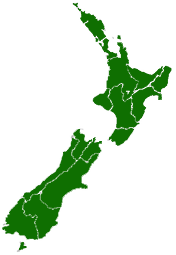
Milk is only sourced from cows in New Zealand.
The cows live outside on paddocks throughout the year, roaming freely under New Zealand’s typical 2,000 annual sunshine hours.
Cows graze on fresh pasture as their primary food source. To ensure that their nutritional needs are met, the cows are provided with supplementary feed during winter and poor weather conditions.
Dairy farming practices in New Zealand varies depending on region and season, as climate factors influences grass nutrition and growth.
To ensure efficient use of farmland and continuous supply of pasture, fields are rotated regularly with cow herds being allocated to a specific paddock during each rotation.
In New Zealand, over the entire dairy season there is on average approximately 1 hectare of farmland for every 2-3 cows . With farm rotation, at any given time the cow-to-field density will vary depending on local farming practices, seasonality, weather conditions and cow's natural inclination to form groups as a herd animal.
Milking
The cows are typically milked a maximum of twice a day during the peak dairy season, reducing to once a day in the lower season.
Theland Supply Chain
Farm to Glass:
The safety and quality practices in place across the supply chain have been verified, including the milk source; New Zealand’s lower carbon milk system.
Select into any part of the supply chain to view the verified activities and assurances at each step.
The Farm
Farm Assurances for environment and cows
The cows are milked a maximum of twice a day.
The fresh, raw milk is cooled immediately to 4-7 degrees Celcius and kept chilled on the farm, awaiting collection.
- The supply farms operate under an independently audited and approved Risk Management Programme (RMP) to ensure quality of milk is maintained.
- Health checks and tests are regularly undertaken on cows and their milk.
- Any infected or unhealthy animals are separated from the herd, and their milk withheld.
- Milk is tested for harmful bacteria, chemical residues and contaminants at a recognised laboratory.
- Milk is picked up from the farm using dedicated tanker trucks and transported to the factory.
- All tankers have an automatic computer controlled milk sampling system on board.
The milk is not accepted by the dairy factory if the temperature, colour or flavour is not to the required specification.
The Factory
Dedicated transport from farm to factory.
The chilled fresh raw milk is transported from the farms to the processing factory in dedicated tankers
Milk is not accepted by the dairy factory if the temperature, colour or flavour is not to the required specification.
The milk processing facility is registered for a Risk Management Programme as required by the Animal Products Act, 1999.
The factory is registered with the New Zealand Ministry for Primary Industries (MPI) and Certification and Accreditation Administration of the People's Republic of China (CNCA)
Factory Assurances
- Samples of milk are taken upon arrival at the factory and tested against specification before the milk is accepted and approved for unloading.
- The milk is standardised and sterilised by heating to 138˚C.
- Samples are taken and tested during processing to ensure the milk product is of the highest quality.
- Factory processes are regularly independently audited to ensure Risk Management Plan (RMP) requirements are being maintained.
- The sterilised milk is packaged into individual cartons.
- All product units are individually coded with date, time, line number, and jaw number for traceability.
- The product is tested using both in-house (factory) and external accredited laboratories through the process. Final product testing ensures compliance with NZ regulations.
- Once all laboratory tests are completed and passed, New Zealand's Ministry for Primary Industries (MPI) issues a health certificate, making it eligible for export.
- A health certificate must be issued before any product leaves factory control.
- All products are stacked in pallet sized units, stretch wrapped and barcoded for traceability.
- The product is loaded into a shipping container, which is then locked.
- A numbered Ministry for Primary Industries (MPI) seal is applied to the container.
- The container is loaded onto an approved vehicle for delivery to the wharf.
Shipping
The shipping company must ensure that the products are accompanied by all EAD (export accompanied documents) that is required by the importing country, including:
- Customs documents
- Export (Health) Certificates. Issued by the NZ Ministry for Primary Industries, providing official, government-to-government assurances about the product.
- Certificates of Analysis (contain actual laboratory results from chemical, microbial and physical tests)
- Any other documentation required by the importing country must be completed and approved before it can be loaded on-board (this includes import permits and registration with the General Administration of the Peoples Republic of China for Quality Supervision, Inspection and Quarantine AQSIQ)
On arrival in China, the shipment is checked by China Customs to confirm the documentation meets all import criteria prior to release.
- Once cleared, the product is sent to the distribution warehouse.
Retail
Origin transparency
The products arrive at the warehouse, where they are managed using barcoding and traceability systems. No product leaves the warehouse until it receives a final quality check.
- Product is packed onto delivery trucks and distributed to individual shops, supermarkets and other customers.
- Retailers ensure that the product is fresh by using good stock rotation, and checking best before dates before selling product to consumers.
- The AQ Assured™ and QR code are available for consumers to scan in order to be sure of the safety and quality measures undertaken throughout the product supply chain.
 Environmental
Environmental
Theland’s New Zealand milk comes from cows that live outside on paddocks throughout the year.
Outdoor grazing is one factor that New Zealand dairy farmers leverage to achieve the world’s lowest carbon footprint for milk production (total greenhouse [GHG] emissions per kg of product, cradle to farm gate boundary). This is evidenced by international carbon benchmarking studies.
New Zealand’s dairy farmers are committed to ensuring that the dairy sector remains an efficient producer of low emissions milk by working to further reduce the greenhouse gas emissions produced on farm.
Reduction targets for greenhouse emissions (carbon dioxide, nitrous oxide, and methane) are outlined within the New Zealand’s Government Climate Change Response (Zero Carbon) Act.
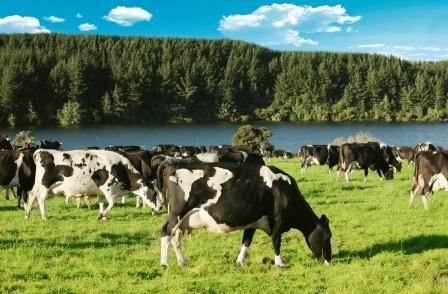
Theland Low Fat UHT Milk (4.0g protein) Prisma is produced in compliance with New Zealand's Resource Management Act (2009) , and local council Resource Management Plans , which set out rules and regulations around management of the New Zealand enviroment. These rules include:
- Disposing of waste in ways that prevent pollution
- Controlling manufacturing emissions to ensure air quality is maintained
- Using only approved chemicals in a way that will not harm the environment
- Operating within a safe distance of waterways to avoid erosion and protect water quality
 Social & Ethical
Social & Ethical
Animal Welfare
All milk suppliers for Theland products are required to meet the New Zealand Animal Welfare Standards
The standard requires animals to be allowed the following five freedoms:
- Freedom to display normal patterns of behaviour
- Freedom from thermal and physical discomfort
- Freedom from thirst, hunger and malnutrition
- Freedom from distress
- Freedom from, or rapid treatment of, illness or injury
 Safety & Quality
Safety & Quality
Laboratory Tested for Safety & Quality
Theland Low Fat UHT Milk (4.0g protein) Prisma is laboratory tested for safety throughout the production process using both in-house (factory) and independent and accredited laboratories.
Testing is undertaken at each step from raw milk collection, during processing, and again upon completion of the final product.
This testing regime ensures final products meet the nutritional descriptions on their label.
Samples are also tested for harmful bacteria or other contaminants.
Produced Under New Zealand Government Regulations
New Zealand has Acts and Regulations in place to ensure all dairy products produced are safe for consumers and that manufacturers use fair and sustainable practices. All dairy products must comply with the Animal Products Act, 1999 and all milk suppliers must meet the New Zealand Animal Welfare standards.
These regulations include:- No hormones or growth promotants are permitted
- All food safety hazards must be controlled using Codex based Hazard Analysis Critical Control Point (HACCP) principles
- All chemicals used on a manufacturing site must be approved by the New Zealand Government’s Ministry for Primary Industries
- Hygiene standards for facilities, equipment and people must be met
- All producers, manufacturers, transporters, packing and storage facilities operate a Risk Management Programme
Meets Overseas Market Access Requirements
This product meets the market access requirements of the countries to which it exports
Auditing
The factory environment, processes and records are independently audited in order to uphold their Risk Management Programme (RMP), Hazard Analysis Critical Control Points (HACCP) and other certifications.
 Nutrition
Nutrition
The 100% raw milk is sourced from New Zealand farms.
Theland UHT milk contains no added colouring agents, sweeteners, thickening agents, gelatine, or preservatives.
This product contains calcium, an important source of nutrition for building strong, dense bones early in life, and keeping bones strong and healthy in later life.
This product contains 4.0g of natural protein per 100mL. Protein is important for the growth and repair of the body’s cells and for building muscle.
Nutritional Information
| Items | per 100mL | NRV % |
| Energy | 203kJ | 2% |
| Protein | 4.0g | 7% |
| Fat | 1.4g | 2% |
| Carbohydrate | 4.9g | 2% |
| Sodium | 45mg | 2% |
| Calcium | 122mg | 15% |
